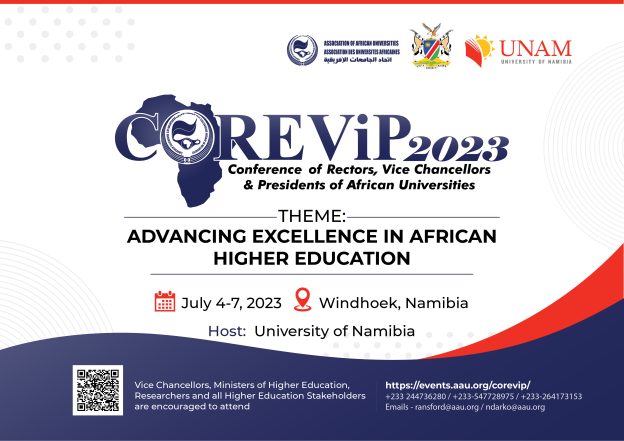
Rebecca McGuire-Snieckus
University of Namibia and Association of African Universities’ 22nd Conference of Rectors, Vice Chancellors and Presidents of African Universities (COREVIP)
Posted on September 9, 2023

The Association of African Universities (AAU) in collaboration with the Republic of Namibia and the University of Namibia (UNAM) hosted the 22nd edition of the AAU’s Conference of Rectors, Vice Chancellors and Presidents of African Universities (COREVIP) from 4th – 7th July 2023, in Namibia.
The COREVIP is an assembly of the Chief Executive Officers of AAU member institutions or their representatives. It is held once every two years with the purpose of collectively examining themes identified as common concerns and priorities for the development of higher education in member institutions and Africa in general, making recommendations primarily to members, as well as to the Governing Board of the Association, and to the Secretariat, and acting as a mid-term forum for taking stock of the implementation of the decisions of the previous AAU General Conference and recommending corrective actions.
This year’s biennial event assembled the leadership of higher education institutions, as well as other senior members of the university community, higher education policymakers, researchers, development partners and funding agencies as well as other stakeholders – from Africa and beyond – to collectively deliberate on issues of common concerns and priorities to the higher education community in Africa.
Holding under the overall theme: “Advancing Excellence in African Higher Education”, the Conference focused on excellence and successful initiatives, interventions and outcomes in African higher education by highlighting the key enabling elements within the sub-themes. These are: 1. Doctoral Education; 2. Institutional Differentiation; 3. Partnership/Cooperation and Internationalisation; 4. University-Industry Linkages; 5. Funding and Financing, and 6. Role of Intellectual Diaspora.
“With attendees joining from diverse backgrounds and countries, the 22nd COREVIP provides an unparalleled learning and networking platform to its participants. It is a golden opportunity for higher education stakeholders to expand their knowledgebase, identify new frameworks and strategies, discover innovative approaches, contribute to shaping Africa’s higher education sector and form new relationships while strengthening existing ones.”– Prof. Olusola Oyewole, Secretary General of the AAU.
“In a globally competitive and digital age where research and innovation are critical for economic and social advancement, the 22nd COREVIP unravels the barriers that inhibit knowledge dissemination, networking and collaboration, while ensuring that higher education institutions in Africa are well placed to play a pivotal role as hubs for research excellence” – Prof. Dr. Kenneth Kamwi Matengu, Vice Chancellor of the University of Namibia and President of the Pan- African Universities.
Conference Organising Institutions
Association of African Universities (AAU) www.aau.org/ – Main Organiser
The Association of African Universities (AAU) is the apex higher education organization in Africa and represents the voice of Africa’s higher education on regional and international bodies. Established in Rabat (Morocco) in 1967, the AAU currently has a membership of over 400 institutions of higher learning across all the linguistic and geographic divides of Africa. Its headquarters is in Accra, Ghana and it currently has two regional offices – East Africa Regional Office (hosted by the University of Khartoum in Sudan) and the North Africa Regional Office (hosted by the Al Azhar University in Egypt), as well as a Country Office in Abuja, Nigeria.
The AAU supports African universities to deliver quality higher education and, as its niche, creates platforms for networking among its members. The Association enjoys a unique capacity for convening most of the higher education community in Africa to reflect and consult on key issues affecting education on the continent. The thrust of its base is the nimble deploying of advocacy, commissioning of studies, and acting and becoming the clearing house and intelligence arm for these higher education institutions on the continent.
The AAU operates in four languages namely, English, French, Arabic and Portuguese. It endeavours to raise the quality of higher education in Africa and strengthen its contribution to Africa’s development by fostering collaboration among its member institutions; providing support to their core functions of teaching, learning, research, and community engagement; and facilitating critical reflection on, and consensus-building around, issues affecting higher education and the development of Africa.
University of Namibia www.unam.edu.na/ – Host
The University of Namibia (UNAM) is the primary institution of tertiary education in Namibia, established by an Act of Parliament on 31August 1992. With 12 campuses located across the country, UNAM is a community-based institution recognised for its academic excellence, exceptional research and community development projects. The University has a diverse student body from 40 countries around the world and has grown rapidly to support a student population of over 25,000. UNAM offers a wide range of undergraduate and postgraduate programmes across various educational platforms, from natural to social sciences.
According to a study conducted by international expert Guillermo Lemarchand, titled Science and Technology & Information Platform for Namibia, UNAM is the leading contributor to new knowledge in the country. The University’s programmes are designed to ensure that each student is fully prepared for their chosen course of study, making UNAM increasingly becoming the university of choice for many citizens of the world. This is evidenced by its level of ranking among African higher education institutions, with The Times Higher Education World University Rankings of 13 October 2022 placing UNAM at 501-600.
UNAM’s alumni have also achieved success, with many recommended for promotion to associate or full professorship by international academic peers around the globe. To date, UNAM has graduated over 55,000 students who are serving the country in various sectors of the economy, with many occupying prominent positions in government, the private sector, and even worldwide.


Responses